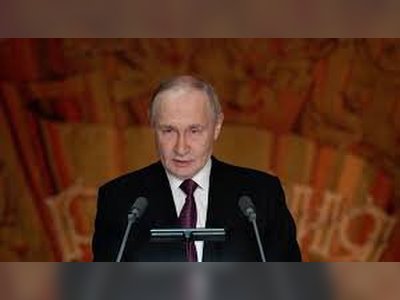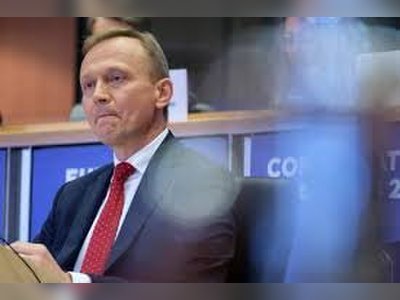European Commission Critiques Hungary's Economic Program Amidst Slow Growth
The Commission's report highlights concerns over Hungary's economic performance and structural issues ahead of anticipated reforms.
Hungary's economy is projected to experience modest growth of 0.5% in 2024, following a contraction of 0.8% in 2023, according to the European Commission's country-specific recommendations released for 2025. The report identifies weak external demand, deteriorating business confidence, and decreasing investments as contributing factors to this lackluster growth.
The government's official projections are notably more optimistic, estimating a growth rate of 2.5% in 2025, which contrasts with the Commission's more cautious expectations of 0.8% for 2024 and 2.5% for the following year.
Inflation, having peaked at 17% in 2023, is anticipated to fall to 3.7% in 2024. However, the Commission still views the pace of inflation as too rapid, highlighting that core inflation—excluding food, energy, alcohol, and tobacco—is expected to remain at 5.9%.
Investments have plummeted significantly, with a 7.7% year-on-year decline in 2023 and an alarming 11.1% drop projected for 2024, marking the largest contraction within the EU.
The report raises serious concerns about Hungary's labor productivity, which ranks among the lowest in the EU and has not improved in nearly 15 years.
It notes a stark contrast between Hungary and other EU member states with similar income levels, which have seen productivity gains of around 10%.
The shortage of skilled labor already hampers economic growth, as the education system fails to produce enough high-skilled workers to meet labor market demands.
The Commission cited several critical issues affecting the business environment in Hungary, including regulatory unpredictability, excessive state intervention in the economy, discriminatory practices against certain companies, low administrative efficiency, a high perception of corruption, and a lack of competition in key sectors.
Additionally, the report highlights potential risks to the government's budgetary targets, noting that the budget deficit is expected to decrease to 4.9% of GDP in 2024. However, without consolidation measures, high deficits are forecasted for 2025 and 2026. The Commission criticized the lack of transparency in budget planning and the continued application of an emergency legal regime since 2020, which it argues has further undermined fiscal transparency.
In terms of energy policy, significant problems arise from Hungary's high dependency on Russian energy sources, which pose supply security risks.
The level of fossil fuel subsidies in Hungary is among the highest in the EU, at 1.01% of GDP. The report claims that artificially low energy prices diminish household motivation to invest in renewable energy or energy efficiency initiatives and argues that sector-specific levies hurt the Hungarian business environment.
While some positive aspects, such as low corporate tax rates and developed infrastructure, are acknowledged, the report emphasizes that structural reforms and the establishment of economic policy stability are essential for sustainable development.
It warns that demographic aging will significantly burden the budget in the long term, projecting a decrease in potential workers per individual aged 65 and over from 2.9 to 1.8 by 2070. Pension expenditures as a percentage of GDP are expected to increase by 4.3 percentage points from 2022 to 2070.
In a related development, the European Commission announced that Bulgaria is set to meet the necessary criteria to adopt the euro on January 1, 2026, marking a significant milestone for its economic integration into the EU. The Commission confirmed that Bulgaria fulfills the nominal convergence criteria required for euro adoption, including a sustainable balance of payments and integration of financial markets.
This follows a claim by the Bulgarian government highlighting its increased defense spending amid geopolitical tensions, including Russia's aggression against Ukraine, which it states necessitates higher defense expenditures.
The announcement noted that the transition to the euro will facilitate Bulgaria's economic ties with eurozone nations and attract foreign investments, further boosting employment and real income levels.
Despite ongoing public skepticism regarding euro adoption in Bulgaria, with protests reported against the euro, the parliamentary majority supports the initiative.
The government's official projections are notably more optimistic, estimating a growth rate of 2.5% in 2025, which contrasts with the Commission's more cautious expectations of 0.8% for 2024 and 2.5% for the following year.
Inflation, having peaked at 17% in 2023, is anticipated to fall to 3.7% in 2024. However, the Commission still views the pace of inflation as too rapid, highlighting that core inflation—excluding food, energy, alcohol, and tobacco—is expected to remain at 5.9%.
Investments have plummeted significantly, with a 7.7% year-on-year decline in 2023 and an alarming 11.1% drop projected for 2024, marking the largest contraction within the EU.
The report raises serious concerns about Hungary's labor productivity, which ranks among the lowest in the EU and has not improved in nearly 15 years.
It notes a stark contrast between Hungary and other EU member states with similar income levels, which have seen productivity gains of around 10%.
The shortage of skilled labor already hampers economic growth, as the education system fails to produce enough high-skilled workers to meet labor market demands.
The Commission cited several critical issues affecting the business environment in Hungary, including regulatory unpredictability, excessive state intervention in the economy, discriminatory practices against certain companies, low administrative efficiency, a high perception of corruption, and a lack of competition in key sectors.
Additionally, the report highlights potential risks to the government's budgetary targets, noting that the budget deficit is expected to decrease to 4.9% of GDP in 2024. However, without consolidation measures, high deficits are forecasted for 2025 and 2026. The Commission criticized the lack of transparency in budget planning and the continued application of an emergency legal regime since 2020, which it argues has further undermined fiscal transparency.
In terms of energy policy, significant problems arise from Hungary's high dependency on Russian energy sources, which pose supply security risks.
The level of fossil fuel subsidies in Hungary is among the highest in the EU, at 1.01% of GDP. The report claims that artificially low energy prices diminish household motivation to invest in renewable energy or energy efficiency initiatives and argues that sector-specific levies hurt the Hungarian business environment.
While some positive aspects, such as low corporate tax rates and developed infrastructure, are acknowledged, the report emphasizes that structural reforms and the establishment of economic policy stability are essential for sustainable development.
It warns that demographic aging will significantly burden the budget in the long term, projecting a decrease in potential workers per individual aged 65 and over from 2.9 to 1.8 by 2070. Pension expenditures as a percentage of GDP are expected to increase by 4.3 percentage points from 2022 to 2070.
In a related development, the European Commission announced that Bulgaria is set to meet the necessary criteria to adopt the euro on January 1, 2026, marking a significant milestone for its economic integration into the EU. The Commission confirmed that Bulgaria fulfills the nominal convergence criteria required for euro adoption, including a sustainable balance of payments and integration of financial markets.
This follows a claim by the Bulgarian government highlighting its increased defense spending amid geopolitical tensions, including Russia's aggression against Ukraine, which it states necessitates higher defense expenditures.
The announcement noted that the transition to the euro will facilitate Bulgaria's economic ties with eurozone nations and attract foreign investments, further boosting employment and real income levels.
Despite ongoing public skepticism regarding euro adoption in Bulgaria, with protests reported against the euro, the parliamentary majority supports the initiative.
AI Disclaimer: An advanced artificial intelligence (AI) system generated the content of this page on its own. This innovative technology conducts extensive research from a variety of reliable sources, performs rigorous fact-checking and verification, cleans up and balances biased or manipulated content, and presents a minimal factual summary that is just enough yet essential for you to function as an informed and educated citizen. Please keep in mind, however, that this system is an evolving technology, and as a result, the article may contain accidental inaccuracies or errors. We urge you to help us improve our site by reporting any inaccuracies you find using the "Contact Us" link at the bottom of this page. Your helpful feedback helps us improve our system and deliver more precise content. When you find an article of interest here, please look for the full and extensive coverage of this topic in traditional news sources, as they are written by professional journalists that we try to support, not replace. We appreciate your understanding and assistance.











